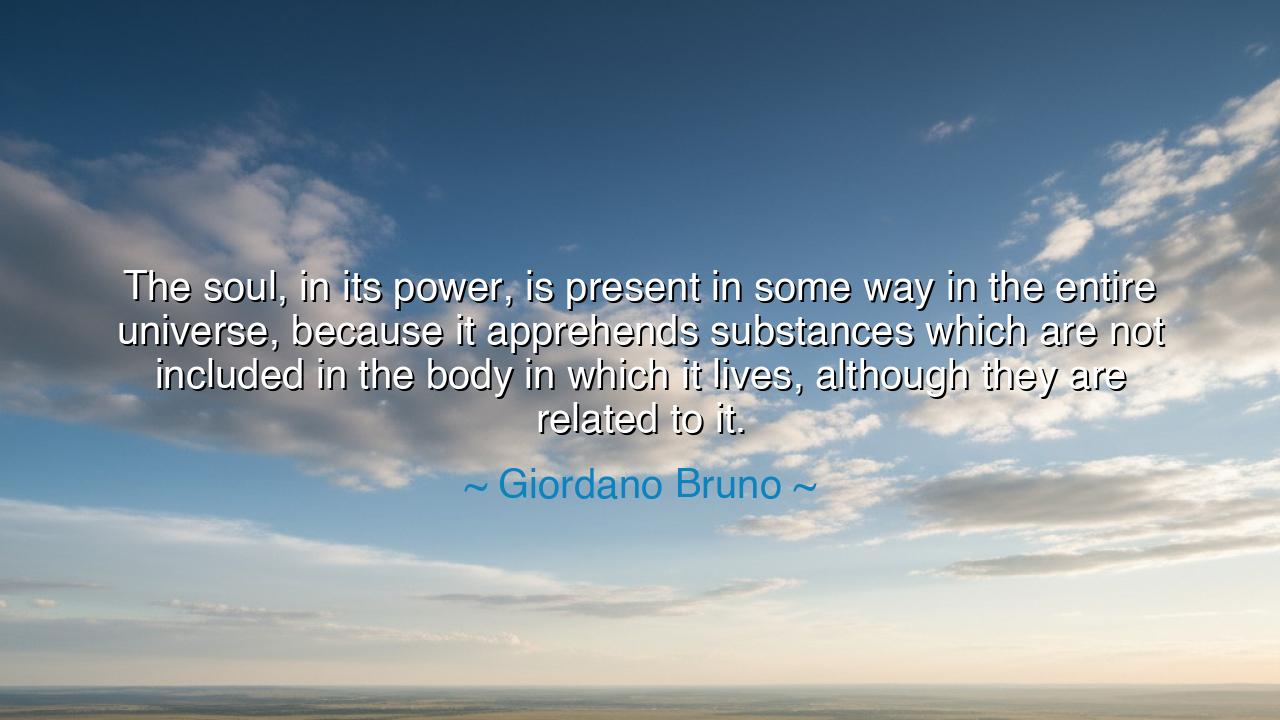
The soul, in its power, is present in some way in the entire
The soul, in its power, is present in some way in the entire universe, because it apprehends substances which are not included in the body in which it lives, although they are related to it.






In these profound words, Giordano Bruno contemplates the boundless power of the soul and its intimate connection with the universe. He declares that the soul, though dwelling within the confines of the body, reaches beyond its physical limits, perceiving and engaging with substances that exist outside its immediate vessel. In this, Bruno illuminates the eternal truth that the soul is not merely a passenger of flesh, but an expansive presence capable of apprehending truths, forms, and essences scattered throughout creation.
The origin of this insight lies in Bruno’s daring exploration of philosophy, cosmology, and metaphysics during the Renaissance. Challenging the orthodoxy of his time, he envisioned a universe filled with infinite worlds and interconnected beings, each touched by the presence of a soul that transcends corporeal boundaries. His writings, which sought to unite the mystical and the rational, reveal a vision of humanity not as isolated, but as intimately woven into the fabric of existence itself, capable of perceiving realities beyond the tangible.
History offers striking examples of this principle in action. Consider Isaac Newton, whose soul and mind extended far beyond the limits of his own body as he apprehended the laws of gravity and motion, uncovering universal truths invisible to ordinary perception. Newton’s ability to grasp phenomena far removed from his immediate senses mirrors Bruno’s teaching: the human soul has the capacity to reach into the cosmos, apprehending substances and relations that transcend physical proximity.
Bruno’s words also speak to the moral and spiritual dimension of human existence. The soul, by apprehending the wider universe, is called to wisdom, responsibility, and contemplation. It reminds us that our understanding and perception are not limited to personal experience alone; we are participants in a vast, interconnected reality. The more the soul cultivates awareness of what lies beyond the body, the more it can act with insight, harmony, and purpose in the world.
Ultimately, this quote is a meditation on transcendence, perception, and the infinite nature of consciousness. Giordano Bruno teaches future generations that the soul is not bound by the body but is a luminous presence touching the universe in countless ways. Let this wisdom endure: to honor the soul is to recognize its power, to awaken its perception of the interconnected cosmos, and to live in harmony with truths that extend far beyond the fleeting confines of flesh. Through such recognition, the human spirit glimpses eternity and participates in the grandeur of all existence.






GNGiang Nguyen
The philosophical boldness of this thought is astounding. It makes me think about how perception shapes reality — perhaps the soul’s ability to reach beyond the body means that knowledge itself transcends the senses. Could this idea anticipate the later Enlightenment concept of universal reason, or even the collective unconscious? It’s fascinating how Bruno combines metaphysics with an almost scientific curiosity about the limits of human understanding.
LNlong nam
This passage resonates with a deep sense of cosmic unity, but I can’t help questioning its implications. If the soul can perceive beyond the body, are our experiences merely fragments of a greater awareness? And if so, does death change anything about that connection? Bruno’s view seems almost mystical, suggesting immortality through universal participation. I wonder whether he saw this as a philosophical belief or a spiritual revelation.
NQPham Nhu Quynh
I feel a sense of wonder reading this — it paints the soul as something infinitely connected. But it also raises a concern: if the soul is everywhere, how do we define individuality? Where does one consciousness end and another begin? Bruno’s vision seems to dissolve boundaries between the self and the universe, which is beautiful but also unsettling. Does this mean personal identity is just an illusion of limited perception?
LLinhh
This quote makes me question how Bruno viewed the relationship between the body and the soul. If the soul can apprehend things beyond the physical, does that mean it’s not bound by time or space? I find this idea both inspiring and mysterious. It suggests a kind of unity between all beings, yet it’s difficult to grasp logically. How can something immaterial truly interact with the material universe in such a profound way?
HDHoai Dinh
I’m intrigued by the spiritual and philosophical depth in this idea. It seems to suggest that the soul has a cosmic reach — that our awareness connects us to all existence. But how literal is this meant to be? Is it a mystical claim about universal consciousness or a metaphor for human understanding and empathy? It makes me wonder whether introspection is actually a way to touch something far larger than ourselves.